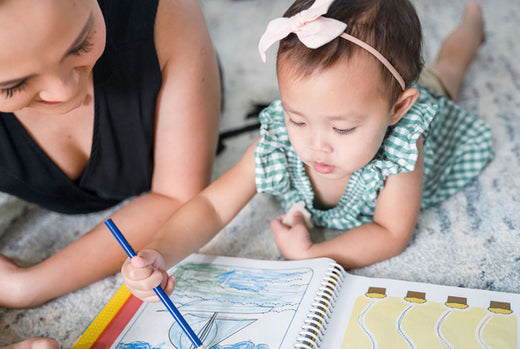

Now that your child is three to five years old, or attending preschool in Singapore, it’s time to loosen the apron strings and let go, at least for a few hours each day.
It’s time for him or her to get to know children of the same age, meet new adults like the preschool teacher or principal. It’s a giant step towards independence, one that requires preparation for both parent and child.
After all, preschool in Singapore is an investment in your child’s future - warranting a handy preschool checklist for all parents.
Preschool in Singapore and Everywhere Else
Child development expert and book author Anna Jane Hays says children can, and do learn at an early age1. So exposing the child to a ‘structured opportunity for learning’ early on is important.
Carnegie Foundation’s groundbreaking research shows that children exposed to early education maximize what they learn from school2. They raise their chances of completing high school and entering college. They’re healthier and more well-off than those who did not experience preschool.
Psychoanalyst Gail Saltz, MD, associate professor of psychiatry at New York-Presbyterian Hospital/Weill Cornell School of Medicine states that preschool promotes a child’s socialization and allows him or her to enjoy learning, and teaches sharing, compromise and getting along3. Applying this to a local context, there’s definitely a lot that goes into drilling down on a preschool in Singapore too.
But not all children are ready for it. Find out if yours is by asking the following items in our preschool checklist:
-
Is the child potty-trained? If he’s not, it’s okay. Some preschools or nurseries are prepared to help these children face this challenge.
-
Can the child do certain things on his or her own, like eating, making his or her way around the classroom, playing games and completing projects with classmates?
-
Is your child able to communicate feelings to peers and adults he or she has met only a few times4?
-
Can the child focus? Can he or she concentrate on a classroom activity for 10 or 20 minutes?
-
Is the child emotionally ready? Can he or she bid mom/dad or the caregiver good-bye without having a meltdown? Is he or she free from sensory processing issues like a disdain for noise and light, tantrums while getting dressed up by others5?
-
Does the child have physical and mental energy? Can he or she stick to a routine? The child may not yet be ready for preschool if he or she takes long morning and afternoon naps.
If your answers to these questions are yes, your child is prepared to taste the joys of preschool. Here’s how both of you can prepare for preschool in Singapore:
-
Act out typical activities
Pretend to be the parent, child and teacher – one at a time6. Bid mom/dad goodbye, take off your shoes, break into song, dance, read stories, play games or take a nap. Assure your child that preschool is a happy place to be. Gently answer questions to help calm the child down.
-
Read books or stories on preschool in Singapore
Surf the net, visit the library or bookstore. Discuss the story about preschool in Singapore and the characters involved. Get your child’s reactions. Doing this can help you check one of the many boxes in the preschool checklist.
-
Create a game about self-help skills
Create a contest between both of you to find out who can pack things into a kiddie backpack faster. Additionally, you can also pretend that you're having a picnic using the child’s lunch fare. Find out who between the two of you can open the lunch box, unwrap the sandwich and return the utensils into the food container faster. These would surely prove to be essential skills for preschool in Singapore.
-
Enjoy yourselves at the preschool/nursery grounds
You can choose to visit the preschool or nursery with your child before the school year starts. For instance, you can try out the playground, explore the classrooms, check out picture books and toys – with the school officials’ go signal, of course. Additionally, you can let your child talk to the teacher of the preschool in Singapore. It will be important for you to build rapport with the teacher at the beginning so you can be open about your concerns from the get-go7.
-
Calm your child down
On Day 1 of preschool or nursery, calm your child down by introducing him or her again to the teacher. Then, let the latter take over to fulfil one of the more important criteria in this preschool checklist. By doing so, you will help your child feel secure with the teacher around. If the child shows separation anxiety, bid goodbye lovingly and leave without fanfare. Make sure not to delay this process, as it will only make your child anxious. Make the decision to wave from the school window instead.
You can also provide your child with his or her favorite toy or family picture to touch and look at during breaks at preschool in Singapore. By doing so, it might make it easy for the child to part with mom/dad or his/her guardian.
-
Check out other ways of learning
Besides preschool in Singapore, there are other places outside the home that can be a hub of learning for your child. Your child can visit the neighborhood playground, public library or the park, etc7.
Now will be the perfect time to sharpen language skills by speaking to your child in complete sentences. Remember to never talk down to him or her.
It's perfectly fine to let your child make simple decisions, like what to wear, when to play at nursery and what to snack on. This way, your child will know what learning really is: never-ending, and loaded with fun.
Be part of the Enfamama A+ Club today to unlock a world of privileges and benefits which include free samples, exclusive vouchers, promotions, expert advice and many more!
Expert Resource:
Dr. Raymond Choy Wai Mun
(MCR 18097A)
MBChB (UK), Aviation Medicine (Singapore)
REFERENCES:
- Is My Child Ready for Preschool? (n.d.) Retrieved August 7, 2020 from:
https://www.webmd.com/parenting/features/my-child-ready-preschool#1 - Is My Child Ready for Preschool? (n.d.) Retrieved August 7, 2020 from:
https://www.webmd.com/parenting/features/my-child-ready-preschool#1 - Is My Child Ready for Preschool? (n.d.) Retrieved August 7, 2020 from:
https://www.webmd.com/parenting/features/my-child-ready-preschool#1 - How to Know If Your Child is Ready for Preschool (n.d.) Retrieved August 7, 2020 from:
https://www.understood.org/en/learning-thinking-differences/signs-symptoms/academic-readiness/how-to-know-if-your-child-is-ready-for-preschool - Sensory Processing Issues Explained (n.d.) Retrieved August 7, 2020 from:
https://childmind.org/article/sensory-processing-issues-explained/ - Preschool Prep: How to Prepare Your Toddler for Preschool (February 8, 2010) Retrieved August 7, 2020 from:
https://www.zerotothree.org/resources/78-preschool-prep-how-to-prepare-your-toddler-for-preschool - Talking to Your Child’s Preschool Teacher (n.d.) Retrieved August 7, 2020 from:
https://kidshealth.org/en/parents/talk-to-preschool-teacher.html - Preschoolers (3 to 5 Years of Age) ((n.d.) Retrieved August 7, 2020 from:
https://www.cdc.gov/ncbddd/childdevelopment/positiveparenting/preschoolers.html





